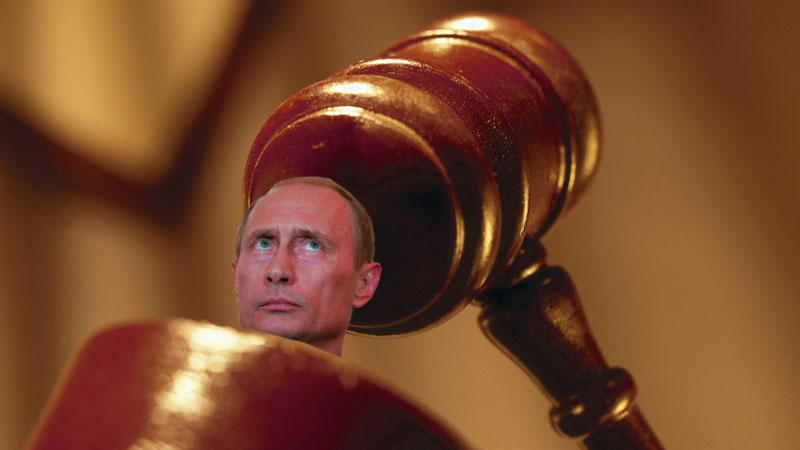
Images edited by Kevin Rothrock.
In a challenge to the power of the Russian presidency, five State Duma deputies recently introduced legislation aimed at rolling back Russia's current “counter-sanctions” regime.
In early August 2014, the Kremlin countered Western sanctions over Moscow's actions toward Ukraine with an executive order banning the import of a broad range of food and agricultural products from Europe and the United States.
The Duma deputies’ bold new bill, published on the official government website on February 25, was proposed by four A Just Russia deputies, Valery Zubov, Sergey Petrov, Sergey Dornonin, and Mikhail Serdyuk, along with the independent deputy Dmitry Gudkov, who was expelled from A Just Russia in March 2013.
The legislation calls for amending the current laws “On Special Economic Measures” and “On National Security” to stipulate that enacting special economic measures, such as the counter-sanctions, would require the approval of the Parliament, and could not be done by executive decree.
In justifying the need for this change, the deputies cite Article 34, Section 1, of the Russian Constitution:
Статья 34. 1. Каждый имеет право на свободное использование своих способностей и имущества для предпринимательской и иной не запрещенной законом экономической деятельности.
Article 34. 1. Everyone shall have the right to the free use of his or her abilities and property for entrepreneurial and economic activities not prohibited by law.
The deputies argue that the ban on the import of food products, which are “beneficial and safe for the health of citizens,” violates Article 34 of the Constitution by depriving Russian firms of products vital to their business models for which there exists no economically reasonable alternative.
To illustrate this point, the proposal tells the story of a Murmansk fish plant that had been in business since 1927, but was forced to shut down due to the import ban.
The deputies also acknowledge Article 55 of the Russian Constitution in their proposal, however, which states:
Статья 55. 3. Права и свободы человека и гражданина могут быть ограничены федеральным законом только в той мере, в какой это необходимо в целях защиты основ конституционного строя, нравственности, здоровья, прав и законных интересов других лиц, обеспечения обороны страны и безопасности государства.
Article 55. 3. The rights and freedoms of citizens may be limited by federal law only to the extent necessary for the protection of the fundamental principles of the constitutional system, morality, health, the rights and lawful interests of other people, and for ensuring national defense and state security.
This constitutional article underlies the Kremlin's framing of counter-sanctions as a defensive response to external aggression, in the form of Western sanctions, and therefore as defense of the state.
As the story gained traction in the Russian media, former Finance Minister Alexey Kudrin took to Twitter to weigh in on the proposal:
Продовольственные антисанкции были не срочные. Они ударили и по самим россиянам. Лучше было обсудить их в Думе
— Алексей Кудрин (@Aleksei_Kudrin) February 26, 2015
The food anti-sanctions were not an urgent matter. They have hurt Russians themselves. It would have been better to discuss them in the Duma
Sergey Mitrokhin, leader of the liberal opposition party Yabloko, expressed support for the proposal on Twitter, as well:
“ЯБЛОКО” поддерживает законопроект @gudkovd, запрещающий Путину вводить “антисанкции” http://t.co/xsCAjQsYBO pic.twitter.com/H4OWlLyw0W
— Сергей Митрохин (@mitrokhin) February 26, 2015
“YABLOKO” supports @gudkovd‘s [bill co-sponsor Dmitry Gudkov's] legislation forbidding Putin to enact “anti-sanctions”
The “anti-crisis” march that the Russian opposition had planned to hold on March 1, before the shocking murder of opposition politician Boris Nemtsov in downtown Moscow on Friday, February 27, also listed the cancellation of the counter-sanctions as a demand, identifying the counter-sanctions as the cause of significant food price inflation in Russia. The organizers of the March 1 event have since announced that a memorial for Nemtsov will be held on Sunday in Moscow in place of the march.
The reaction to the proposed legislation was not all positive, of course.
Senator Evgeny Tarlo of the ruling United Russia party quickly announced his intention to introduce legislation giving the president the right to take any economic, political, informational, or other measures against countries that impose unilateral sanctions against Russia. Tarlo explained to Slon that the countries imposing sanctions are carrying out an economic, information, and political war against Russia that is making it necessary for Russia to defend herself, “so we need to give the president the right to respond promptly to such actions.”
For its part, A Just Russia's leadership reprimanded the four deputies who joined Dmitry Gudkov in sponsoring the bill, and demanded that they withdraw their support.
This legislation has practically no chance of being adopted by a legislative branch controlled by regime loyalists in a political climate in which President Putin's approval rating may be as high as 86 percent.
The very fact that a handful of Duma deputies felt emboldened to present such a proposal challenging the president's power, however, may hint at wider whispers of discontent about Russia's gloomy economic situation and controversial foreign policy course.








1 comment